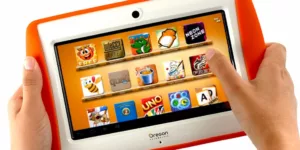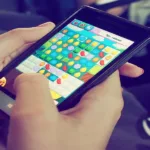There are those who will say, “I’m trying to limit my kids’ screen time”. These individuals are, unfortunately, in denial. “Screens” aren’t going anywhere. The tablet has landed and, contrary to popular belief, this is actually a great thing.
So if you can’t beat ‘em, join ‘em right? You may not control the prevalence of screens but you can certainly choose the right one for your kids by answering these 7 questions.
1. What Is Your Child Interested In?
Remember, this tablet is for your child. It’s to spark his or her interests, imaginations and development. So choose a tablet based on the content available. The best tablets for kids include more than simply popular games. They should also include art-studio apps, e-books and educational games.
You can choose a tablet based on whether your child loves to read more than they love to stimulate their hand-eye coordination with temple-run games, for example.
2. How Old Is Your Child?
The age of your child should be the next point to consider because this will tell you whether you should be going for an all-purpose iOS or Android tablet or get one geared specifically for children, like the Fisher Price Learning Tablet or a LeapFrog Epic.
3. How Much Are You Willing to Spend?
Your desired price point will also be a useful parameter when trying to narrow down your choices of tablets on the market. For example, a Samsung Galaxy Tab S2 would be in a different price category than the Amazon Fire Kids Edition.
If the whole family is planning on using it now and again, it might be worth it to expand your budget and get just one tablet. But if the adults already have their own devices and your children need their own, buying the Kids Edition would be smarter on both the pocket and the purchase.
4. Do You Have More Than One Child?
If more than one of your tots are going to be using the tablet, it’s worth it to look for one that will allow the set up of multiple profiles. This way, each of your children can play their own games, keep their own scores and data, and customize their profile avatar, without having to “share” accounts.
It’s also a good lesson in sharing.
And, this way, you can set up your own “parental” profile and have access to the tablet, to make sure little ones are restricted on content.
5. Can The Design Withstand Young Hands?
No doubt about it — whichever tablet you end up opting for needs to come with design features that are kid-proof. This means they need to either be durable in and of themselves or else outfitted with their own protective, external covers and screen protectors.
Consider using high quality tempered glass covers and rubber or plastic covers with enforced edges to ensure that if your little one drop it, the shock will be absorbed.
Tablets should also be waterproof and have the best quality screens with HD graphics. Since your little ones will be spending quite a bit of their spare time with these devices, make sure that their eyes aren’t vulnerable to screen fatigue.
Some tablets come equipped with “night mode”, where the screen color and lighting changes to help the eyes adjust to the dark and save vision from harsh white light.
6. Does It Need Internet Access?
Some consoles, like the Leapfrog Epic and Fisher Price Learning Tablet come with their own built-in apps and software so parents don’t need to worry about internet connectivity.
Connectivity is usually not an issue in big cities or at home but, if you’re on the go quite a bit or if you use the tablet to occupy your child on long road trips, you might consider getting a data plan for the tablet.
And, of course, because of its ability to connect to the Internet, you’ll want to ensure that your tablet has parent controls and locks on websites set up before your child uses it.
7. Where (and When) Will They Be Using It Most?
If you’re tempted to say, “Everywhere and all the time”, let’s clarify: will your child be using the tablet for extended periods of time, all at once, and frequently? If so, the longevity of battery life should be a big factor in your decision.
What you don’t want is to buy a tablet that has a very specific kind of connector that doesn’t interface with anything else.
You’ll want to choose a tablet that has a jack that can be used with AUX cables as well as a USB port for easy car charging. This way, even if the battery life doesn’t last too long, you can make sure that charging stations are not too far away — parents can use USB inputs in a car or even use a laptop that is plugged in to a socket in order to charge popular tablets.








